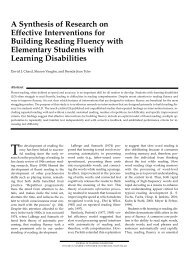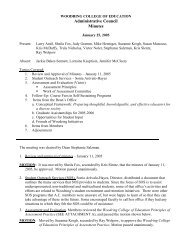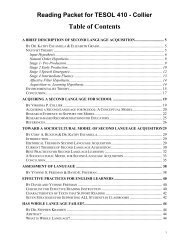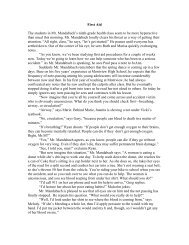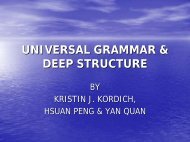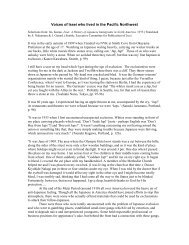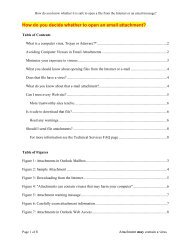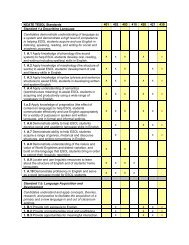herself by strapping a cassette recorder around her waist and listening to audiotapes while sheperformed domestic tasks. (The Everetts lived in a thatch hut that was slightly larger and moresophisticated than <strong>the</strong> huts <strong>of</strong> <strong>the</strong> Pirahã; it had walls and a storage room that could be locked.)During <strong>the</strong> family’s second year in <strong>the</strong> Amazon, Keren and <strong>the</strong> Everetts' eldest child, Shannon,contracted malaria, and Keren lapsed into a coma. Everett borrowed a boat from river traders andtrekked through <strong>the</strong> jungle for days to get her to a hospital. As soon as she was discharged,Everett returned to <strong>the</strong> village. (Keren recuperated in Belem for several months before joininghim.) "Christians who believe in <strong>the</strong> Bible believe that it is <strong>the</strong>ir job to bring o<strong>the</strong>rs <strong>the</strong> joy <strong>of</strong>salvation," Everett said. "Even if <strong>the</strong>y’re murdered, beaten to death, imprisoned-that's what youdo for God.<strong>Un</strong>til Everett arrived in <strong>the</strong> Amazon, his training in linguistics had been lim<strong>ited</strong> to fieldtechniques. "I wanted as little formal linguistic <strong>the</strong>ory as I could get by with," he told me. "Iwanted <strong>the</strong> basic linguistic training to do a translation <strong>of</strong> <strong>the</strong> New Testament." This changedwhen S.I.L. lost its contract with <strong>the</strong> Brazilian government to work in <strong>the</strong> Amazon. S.I.L. urged<strong>the</strong> Everetts to enroll as graduate students at <strong>the</strong> <strong>Sta</strong>te <strong>Un</strong>iversity <strong>of</strong> Campinas (UNICAMP), in<strong>the</strong> state <strong>of</strong> Sao Paulo, since <strong>the</strong> government would give <strong>the</strong>m permission to continue living ontribal lands only if <strong>the</strong>y could show that <strong>the</strong>y were linguists intent on recording an endangeredlanguage. At UNICAMP, in <strong>the</strong> fall <strong>of</strong> 1978, Everett discovered Chomsky's <strong>the</strong>ories. "For me, itwas ano<strong>the</strong>r conversion experience," he said.<strong>In</strong> <strong>the</strong> late fifties, when Chomsky, <strong>the</strong>n a young pr<strong>of</strong>essor at M.I.T., first began to attract notice,behaviorism dominated <strong>the</strong> social science. According to B. F. Skinner, children learn words andgrammar by being praised for correct usage, much as lab animals learn to push a lever thatsupplies <strong>the</strong>m with food. <strong>In</strong> 1959, in a demolishing review <strong>of</strong> Skinner's book "Verbal Behavior,"Chomsky wrote that <strong>the</strong> ability <strong>of</strong> children to create grammatical sentences that <strong>the</strong>y have neverheard before proves that learning to speak does not depend on imitation, instruction, or rewards.As he put it in his book "Reflections on Language" (1975), "To come to know a human languagewould be an extraordinary intellectual achievement for a creature not specifically designed toaccomplish this task."Chomsky hypo<strong>the</strong>sized that a specific faculty for language is encoded in <strong>the</strong> human brain atbirth. He described it as a language organ, which is equipped with an immutable set <strong>of</strong> rules--auniversal grammar--that is shared by all languages, regardless <strong>of</strong> how different <strong>the</strong>y appear to be.The language organ, Chomsky said, cannot be dissected in <strong>the</strong> way that a liver or a heart can, butit can be described through detailed analyses <strong>of</strong> <strong>the</strong> abstract structures underlying language. "Bystudying <strong>the</strong> properties <strong>of</strong> natural languages, <strong>the</strong>ir structure, organization, and use," Chomskywrote, "we may hope to gain some understanding <strong>of</strong> <strong>the</strong> specific characteristics <strong>of</strong> humanintelligence. We may hope to learn something about human nature."Beginning in <strong>the</strong> nineteen-fifties, Chomskyans at universities around <strong>the</strong> world engaged informal analyses <strong>of</strong> language, breaking sentences down into ever more complex tree diagrams thatshowed branching noun, verb, and prepositional phrases, and also "X-bars," "transformations,""movements," and "deep structures" –Chomsky’s terms for some <strong>of</strong> <strong>the</strong> elements that constitute<strong>the</strong> organizing principles <strong>of</strong> all language. ”I’d been doing linguistics at a fairly low level <strong>of</strong>rigor," Everett said. "As soon as you started reading Chomsky’s stuff, and <strong>the</strong> people mostclosely associated with Chomsky, you realized this is a totally different level--this is actuallysomething that looks like science." Everett conceived his Ph.D. dissertation at UNICAMP as astrict Chomskyan analysis <strong>of</strong> Pirahã. Dividing his time between Sao Paulo and <strong>the</strong> Pirahã village,where he collected data, Everett completed his <strong>the</strong>sis in 1983. Written in Portuguese and later© 2008 Dr. Ca<strong>the</strong>rine CollierAll Rights Reserved20
published as a book in Brazil, "The Pirahã Language and <strong>the</strong> story <strong>of</strong> Syntax" was a highlytechnical discussion replete with Chomskyan tree diagrams. However, Everett says that he wasaware that Pirahã contained many linguistic anomalies that he could not fit into Chomsky’sparadigm. "I knew I was leaving out a lot <strong>of</strong> stuff," Everett told me. "But <strong>the</strong>se gaps wereunexplainable to me."The dissertation earned Everett a fellowship from <strong>the</strong> American Council <strong>of</strong> Learned Societies,and a grant from <strong>the</strong> National Science Foundation to spend <strong>the</strong> 1984-85 academic year as avisiting fellow at M.I.T. Everett occupied an <strong>of</strong>fice next to Chomsky’s; he found <strong>the</strong> famedpr<strong>of</strong>essor brilliant but wi<strong>the</strong>ring. "Whenever you try out a <strong>the</strong>ory on someone, <strong>the</strong>re's alwayssome question that you hope <strong>the</strong>y won't ask," Everett said. "That was always <strong>the</strong> first thingChomsky would ask."<strong>In</strong> 1988, Everett was hired by <strong>the</strong> <strong>Un</strong>iversity <strong>of</strong> Pittsburgh. By <strong>the</strong>n, Chomsky’s system <strong>of</strong> ruleshad reached a state <strong>of</strong> complexity that even Chomsky found too baroque, and he had begun t<strong>of</strong>ormulate a simpler model for <strong>the</strong> principles underlying all languages. Everett faithfully keptabreast <strong>of</strong> <strong>the</strong>se developments. "Chomsky sent me <strong>the</strong> papers that he was working on," he said. "Iwas like many <strong>of</strong> <strong>the</strong> scholars, in that I made regular pilgrimages to sit in Chomsky's classes tocollect <strong>the</strong> handout and to figure out exactly where <strong>the</strong> <strong>the</strong>ory was today." At <strong>the</strong> same time,Everett says that he was increasingly troubled by <strong>the</strong> idiosyncrasies <strong>of</strong> Pirahã. "None <strong>of</strong> it wasaddressed by Chomskyan linguistics," he told me. "Chomsky’s <strong>the</strong>ory only allows you to talkabout properties that obtain <strong>of</strong> tree structures.<strong>In</strong> <strong>the</strong> early nineties, Everett began to reread <strong>the</strong> work <strong>of</strong> linguists who had preceded Chomsky,including that <strong>of</strong> Edward Sapir, an influential Prussian-born scholar who died in 1939. A student<strong>of</strong> <strong>the</strong> anthropologist Franz Boas, Sapir had taught at Yale and studied <strong>the</strong> languages <strong>of</strong> dozens<strong>of</strong> tribes in <strong>the</strong> Americas. Sapir was fascinated by <strong>the</strong> role <strong>of</strong> culture in shaping languages, andalthough he anticipated Chomsky’s preoccupation with linguistic universals, he was moreinterested in <strong>the</strong> variations that made each language unique. <strong>In</strong> his 1921 book, "Language," Sapirstated that language is an acquired skill, which "varies as all creative effort varies--not asconsciously, perhaps, but none<strong>the</strong>less as truly as do <strong>the</strong> religions, <strong>the</strong> beliefs, <strong>the</strong> customs, and<strong>the</strong> arts <strong>of</strong> different peoples." Chomsky, however, believed that culture played little role in <strong>the</strong>study <strong>of</strong> language, and that going to far-flung places to record <strong>the</strong> arcane babel <strong>of</strong> near-extincttongues was a pointless exercise. Chomsky's view had prevailed. Everett began to wonder if thiswas an entirely good thing."When I went back and read <strong>the</strong> stuff Sapir wrote in <strong>the</strong> twenties, I just realized, hey, this reallyis a tradition that we lost," Everett said. "People believe <strong>the</strong>y’ve actually studied a languagewhen <strong>the</strong>y have given it a Chomskyan formalism. And you may have given us absolutely no insightwhatsoever into that language as a separate language."Everett began to question <strong>the</strong> first principle <strong>of</strong> Chomskyan linguistics: that infants could notlearn language if <strong>the</strong> principles <strong>of</strong> grammar had not been pre-installed in <strong>the</strong> brain. Babies areba<strong>the</strong>d in language from <strong>the</strong> moment <strong>the</strong>y acquire <strong>the</strong> capacity to hear in <strong>the</strong> womb, Everettreasoned, and parents and caregivers expend great energy teaching children how to say wordsand assemble <strong>the</strong>m into sentences--a process that lasts years. Was it really true that language, asChomsky asserted, simply “grows like any o<strong>the</strong>r body organ"? Everett did not deny <strong>the</strong> existence<strong>of</strong> a biological endowment for language-- humans couldn't talk if <strong>the</strong>y did not possess <strong>the</strong>requisite neurological architecture to do so. But, convinced that culture plays a far greater rolethan Chomsky’s <strong>the</strong>ory accounted for, he decided that he needed to "take a radical reexamination<strong>of</strong> my whole approach to <strong>the</strong> problem."© 2008 Dr. Ca<strong>the</strong>rine CollierAll Rights Reserved21
- Page 2 and 3: "Those who arrive by age 12 or 13 m
- Page 5: Article I.2 Are Signed Languages "R
- Page 8 and 9: Biological analyses of the status o
- Page 10 and 11: and beyond, speaking and signing ch
- Page 12 and 13: Conclusion: Are Signed Languages Re
- Page 14 and 15: Article I.3 The Interpreter: Has a
- Page 16 and 17: A few weeks earlier, I had called F
- Page 18 and 19: “We struggled even getting to the
- Page 22 and 23: In 1998, after nine years as the ch
- Page 24 and 25: momentary burst of excitement that
- Page 26 and 27: can shape core grammar. Because the
- Page 28 and 29: The authors compared animal and hum
- Page 30 and 31: monkey moved. He followed it with h
- Page 32 and 33: delight, fear, laughter, and surpri
- Page 34 and 35: Piipaío in a hut: Pirahã huts typ
- Page 36 and 37: LEP students, and equitable organiz
- Page 38 and 39: 4. Second language development crea
- Page 41 and 42: curriculum or "teaching to the test
- Page 43 and 44: portfolio work was scanned and stor
- Page 45 and 46: experiences of many groups of stude
- Page 47 and 48: While not disagreeing that interpre
- Page 49 and 50: sound educational practice, however
- Page 51 and 52: arises from the efforts to abstract
- Page 53 and 54: Article II.2 Cross-Cultural Communi
- Page 55 and 56: males who can serve as positive rol
- Page 57 and 58: Understanding another culture is a
- Page 59 and 60: Pets and AnimalsWhich animals are v
- Page 61 and 62: to teach standard English is reflec
- Page 63 and 64: Asking personal questions of a pers
- Page 65 and 66: Using Cross Cultural Communication
- Page 67 and 68: Why Do Nonstandard English-Speaking
- Page 69 and 70: Before beginning to teach standard
- Page 71 and 72:
• Negative attitudes toward low p
- Page 73 and 74:
New standardized tests and assessme
- Page 75 and 76:
Each of the behaviors listed above
- Page 77 and 78:
Article II.3 Hard Work Hypothesis:
- Page 79 and 80:
each point higher in SES, students
- Page 81 and 82:
This case does not provide strong s
- Page 83 and 84:
Article II.4 Language Acquisition a
- Page 85 and 86:
1992, p. XI). These researchers, wh
- Page 87 and 88:
comprehend a word within a specific
- Page 89 and 90:
more to the truthfulness of the chi
- Page 91 and 92:
This idea of “semilingualism” c
- Page 93 and 94:
Article III.1 A Brief Description o
- Page 95 and 96:
take different lengths of time to c
- Page 97 and 98:
example, should involve the same co
- Page 99 and 100:
As with all stages of BICS acquisit
- Page 101 and 102:
Assessment techniques at stage 3 ca
- Page 103 and 104:
different. Therefore, the social di
- Page 105:
integrative motivation. Basically,
- Page 109 and 110:
(Ellis, 1985; Hakuta, 1986). Howeve
- Page 111 and 112:
that sociocultural processes have o
- Page 113 and 114:
Article III.3 How Children Acquire
- Page 115 and 116:
phonetic units (unique to signed la
- Page 117 and 118:
Article III.4 Toward a Sociocultura
- Page 119 and 120:
emember is that the fundamental goa
- Page 121 and 122:
The best practices models can be th
- Page 123 and 124:
By focusing on the dialectic betwee
- Page 125 and 126:
intergenerational wisdom shared by
- Page 127 and 128:
Daily Realities RecappedThe above v
- Page 129 and 130:
traditions. At a time in our histor
- Page 131 and 132:
We will now look at two examples of
- Page 133 and 134:
Speakers communicate fluently, main
- Page 135 and 136:
question the effects of such attitu
- Page 137 and 138:
Article IV.3 Culture Change: Effect
- Page 139 and 140:
and psychological characteristics o
- Page 141 and 142:
Contraryto what wewere expecting, t
- Page 143 and 144:
Article V.1 Assessment in ESL & Bil
- Page 145 and 146:
vocabulary does the student lack?Is
- Page 147 and 148:
whether they are LEP and to provide
- Page 149 and 150:
Fourth, ESL and bilingual program s
- Page 151 and 152:
competent reader/writer. All versio
- Page 153 and 154:
Table 1Comparison of Recent Accultu
- Page 155 and 156:
unilinear model, which measures the
- Page 157 and 158:
an English-only instructional progr
- Page 159 and 160:
Article V.3 Assessment of English L
- Page 161 and 162:
8. Change answers only for a very g
- Page 163 and 164:
Riles, 1979; Jose P. v Ambac, 1983)
- Page 165 and 166:
proficiency is often underestimated
- Page 167 and 168:
Finally, when second language reade
- Page 169 and 170:
for their decisions, noting issues
- Page 171 and 172:
As mentioned above, when the transi
- Page 173 and 174:
ather than generic adjectives and t
- Page 175 and 176:
their imagined points of view. Ther
- Page 177 and 178:
English texts and demonstrate progr
- Page 179:
using inter-district teams). In the





